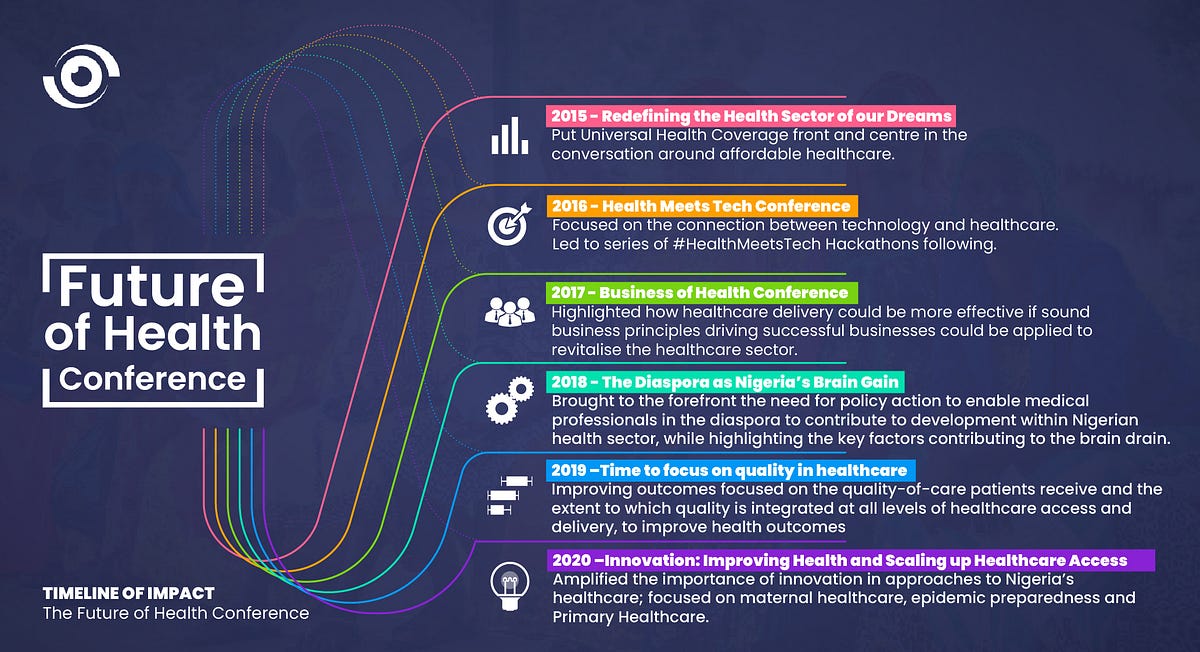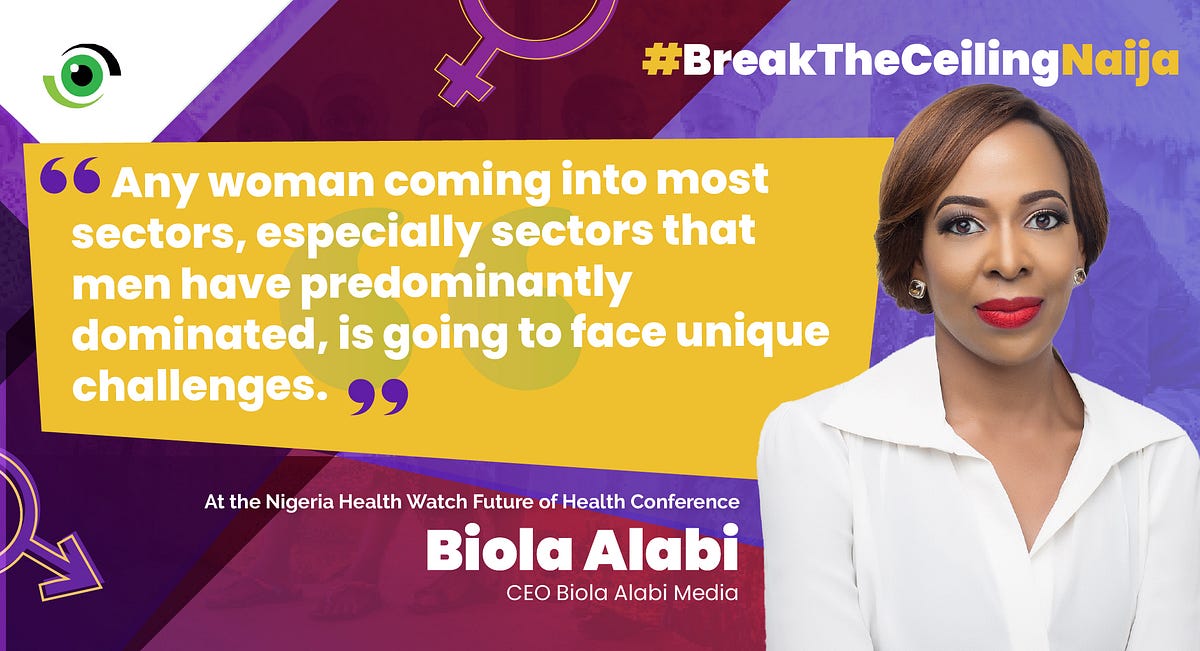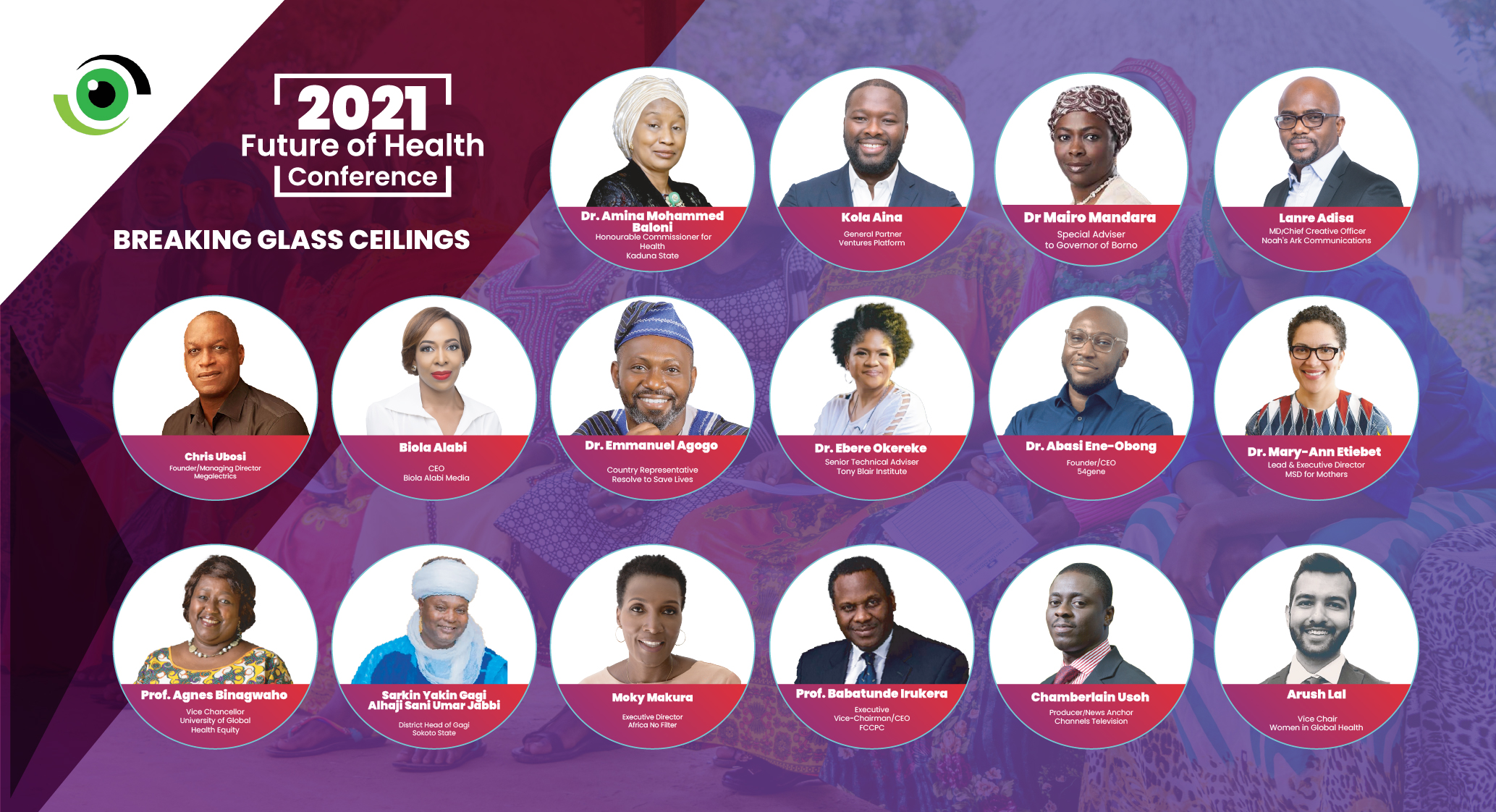By Dara Ajala-Damisa and Bunmi Oyebanji (Lead Writers)
Gender equality does not mean that women and men are the same, it means that their rights, responsibilities, and opportunities do not depend on whether they are born female or male. — Office of the Special Adviser to the Secretary-General on Gender Issues and Advancement of Women (OSAGI)
The 2030 Agenda for Sustainable Development, adopted by all United Nations Member States in 2015, provides a shared blueprint for peace and prosperity for people and the planet, now and into the future. Gender equality lies at the heart of the Agenda which recognises that achieving gender equality is a human right. While being a goal in its own right, gender equality cuts across all 17 Sustainable Development Goals and is reflected in 45 targets and 54 indicators for the SDGs.
The first edition of the Future of Health Conference (FHC) took place in 2015. Nigeria had just elected a new president therefore the conference theme — Redefining the Health Sector of our Dreams — was a timely call to the new government to prioritise health. Outputs and continuing conversations from that conference helped to put Universal Health Coverage front and centre in the conversation around affordable healthcare.
In 2016, the Health Meets Tech Conference focused on the interconnectedness between technology and healthcare. This led to the debut of the first-ever Health and Technology Hackathon, which took place in Lagos in July 2017. In 2018, the focus of the conference offered a perspective to the “brain drain” discourse, by looking at The Diaspora as Nigeria’s Brain Gain, bringing to the forefront the need for policy action to enable medical professionals in the diaspora to meaningfully engage with the Nigerian health sector, while highlighting the push and pull factors contributing to the brain drain. These among other powerful editions have provided a track record of advocacy and impact for a better healthcare sector.

Breaking Glass Ceilings
Globally, women have fewer opportunities for economic participation than men, less access to basic and higher education, greater health and safety risks, and less political representation. Women remain un-represented in leadership positions in finance, politics and governance. Women serve as Heads of State or Government in only 22 countries, while 119 countries have never had a woman leader. In addition, as discussed during the 26th UN Climate Change Conference, women are bearing a disproportionate burden of the climate crisis.
Nigeria is not left behind in the fight for gender equality. In 2006, Nigeria developed a National Gender Policy (NGP) designed to build a just society devoid of discrimination, harness the full potential of all social groups regardless of sex or circumstance, promote and protect the health, social, economic, and political well-being of all citizens to achieve equitable rapid economic growth, etc. However, 15 years after its creation, the NGP has not been implemented.
The 2021 Future of Health Conference took a deep dive into Gender Equality for Sustainable Development. The theme, “Breaking Glass Ceilings”, set the tone for what was an animated discourse on gender equality issues that are often overlooked or even evaded.
The objectives of the dialogue on day one focused on the need to make women’s representation in media more inclusive and develop more gender-balanced news stories; elevating the conversation on how men can support women’s representation in male dominated leadership spaces as well as amplifying the critical importance of women in leadership as a driver of improved gender equality.
Women in Media
The underrepresentation of women in media — both in leadership and as expert sources — is a fundamental issue. Hence, the impact of women’s representation or the lack thereof were deliberation points for the panellists on the ‘Women in Media’ panel. Based on their critical experience in media, panellists identified recommendations to improve the current media landscape for greater gender diversity in Nigeria.
A core recommendation was on increasing the visibility and availability of female role models as experts and decision makers on how news is portrayed. As Biola Alabi, CEO, Biola Alabi Media said, “For us to achieve a healthy society, we need women to be representative, be part of these conversations, from a policy perspective. We need to start to change the language we use when we talk about sexual health, sexual and reproductive health”.

Chamberlain Usoh, Producer/Anchor, Channels Television, shared how, over time, his views about projecting the important roles that women and girls in society play in programming has progressively changed. According to him, this portrayed the power of deliberate workplace policies and programming to address gender issues.
Chris Ubosi’s experience as founder and CEO of Megalectrics resonated with Chamberlain’s thoughts. “They say to increase chances of winning the lottery, you must first buy a ticket. The same is true to expand the influence of women in the media. There should be training amongst journalists to discover the stereotype of the patriarchy.”
The media leads on the panel agreed that media houses are responsible for implementing policies that address issues like maternity leave, safety at work, equitable treatment, and pay parity for women in the media.
HeForShe
HeForShe is an invitation for men to stand in solidarity with women to create a bold, visible and united force for gender equality. Men are mostly in the driver’s seat when it comes to leadership across the globe, accounting for 76% of senior leadership positions globally. It is thus imperative that they should be the main catalysts in pushing for gender equality.
Kola Aina, General Partner, Ventures Platform shared key insights around gender equity in the venture capital industry. Data, he said, points to the fact that contrary to popular misconceptions, “a number of our high performing portfolio companies are led by female founders. We find that these companies are some of our better performing companies, and so it’s actually good business to back female founded businesses”.
Professor Babatunde Irukera, Executive Vice Chairman/CEO, Federal Competition and Consumer Protection Commission (FCCPC) pointed to the lack of data that has spurred the misgivings many companies have about women in leadership.
For Dr Amina Baloni, Honourable Commissioner for Health Kaduna State, empowering young girls and women will require deliberate policies and men must be intentional about supporting women. “The perception that women should not be in certain places should be changed,” she said.
To create an enabling environment for women and girls to thrive alongside men and boys, outputs from the conference show that it is imperative to increase the number of women who can stand to favourably compete in the marketplace. Some of the ways to achieve these include women already in leadership mentoring women, increasing the visibility of female experts through deliberate action by the media, and continuously identifying and rejecting gender stereotypes.
Women in Leadership
Women are powerful agents of change, and the benefits of diversity and gender parity in leadership and decision-making are increasingly recognised in all spheres. Still, women continue to be under-represented at the decision-making level in the areas of policy, business, and community life.
To mitigate these issues, Lanre Adisa, MD/Chief Creative Officer, Noah’s Ark Communications, proffered solutions such as flexible work options and more male involvement in family responsibilities and childcare which he believes will reduce the need for trade-offs that women often feel compelled to make at some point in their careers. These suggestions are backed by evidence and organisations that prioritise these policies have been known to increase their bottom line in the long run.
Moky Makura, Executive Director, Africa No Filter, agrees that since women’s issues are human issues, “If you see something, say something. If you see that women are not being represented, say something. When people start to say something, that’s when we will see the change that we desire.” This supports the conference main advocacy objective that men and women should be champions of gender equality, and this must be consistent in policy and practice across sectors.
These leaders in global businesses agree that any industry that doesn’t give women equal opportunity to rise to the top of their careers because of their biological needs is operating at a loss. When almost 50% of a population is limited in scope of what they can or cannot achieve, then the race to Sustainable Development might as well be run on an engine with one wheel.
Gender Equality for Women’s Health
Gender inequality and gender bias results in irregular access to health care, education and other basic needs for women and girls. This influences their health seeking behaviour and wellbeing, negatively impacting their health outcomes. Discussions on day two were divided into three panel sessions: ‘Elevating the Importance of Quality Women’s Health’’, ‘Men as Change Agents’, and ‘The Girl Child Dividend’, a World Bank-supported panel on the role of the healthy productive adolescent girl in generating Nigeria’s demographic dividend.
For Dr. Mary-Ann Etiebet, Lead and Executive Director, MSD for Mothers, prevailing culture impacts poor maternal health outcomes for women. This is typified when the countries that foster high levels of gender bias are the same countries where most maternal deaths occur. On leadership in healthcare, Dr. Etiebet reiterated that women make 70% of the global healthcare workforce, but only 10% to 20% of leadership positions are occupied by women.
Elevating the Importance of Better-Quality Women’s Health
Dr. Ebere Okereke, Senior Technical Advisor, Tony Blair Institute echoed Dr Etiebet’s sentiments adding that despite the proliferation of women in the health workforce, the higher up you go, the fewer women there are. “That means that the people who know best what is needed are not contributing to the decision making about the system. And that does not result in good quality healthcare,” she said.

The World Health Organisation has reported that 15% of deaths in low- and middle-income countries are as a result of poor-quality health care, and their economic costs is valued at about $1.6 billion annually. According to Prof. Agnes Binagwaho, Vice Chancellor, University of Global Health Equity, to increase the quality of care for women, quality of care delivery should be prioritised at all levels of care, and this can only be achieved by reinforcing inclusivity at all touchpoints of care. This includes providing access to social determinants of quality health care such as education and meaningful work for women.
Empowering women to make life-saving decisions about their health care is crucial to their survival and this was iterated by Dr. Okereke and Dr. Etiebet. This could involve increasing access to life-saving information by way of simple technology or access to finances that will afford a woman of life-saving medicine.
Men as Change Agents in Supporting Women’s Health
The “Men as Change Agents in Supporting Quality Women’s Health” panel discussed empowering women through education as men who are averse to their wives being treated by male health workers will be more willing to allow their wives access healthcare when they know that they are being attended to by female doctors and nurses.
The Girl Child Dividend
Honourable Oriyomi Onanuga, Chairperson, House Committee on Women gave the keynote address on the panel session and opined that if Nigeria must enjoy any demographic dividend from the girl child in the future, it will depend on the amount of investment being made in the lives of adolescent girls in Nigeria today.
Dr. Olumide Okunola, Senior Health Specialist, World Bank Nigeria, discussed the role of the healthy productive adolescent girl in generating Nigeria’s demographic dividend. “There is a big opportunity for Nigeria to reap a demographic dividend, only if we have favorable changes in our population age structure”, he opined.
According to Tekabe Belay, Program Leader, Human Development, World Bank, investing in adolescent girls, particularly keeping them in school, and ensuring they are able to complete their secondary school is a huge investment that Nigeria can make in order to ensure a much-needed demographic dividend. “….it requires a multi sector intervention,” he added.
The 2021 Future of Health Conference brought together a diverse line up of speakers. The goal this year was to provide an elevated platform where experts from different walks of life could come together to share their experiences on the impact of gender equality in their sectors, present recommendations for individuals, communities, organisations and governments to promote gender equality, with the promise of positive dividend, proffer solutions for how gender equality could lead to sustainable development and better quality of care for women who have been historically disadvantaged. It is the hope of the organising committee that these insights and recommendations can provide a blueprint for young girls and women to break glass ceilings wherever they may find themselves.



Nice one,I will love to be a part of the women changing lives.